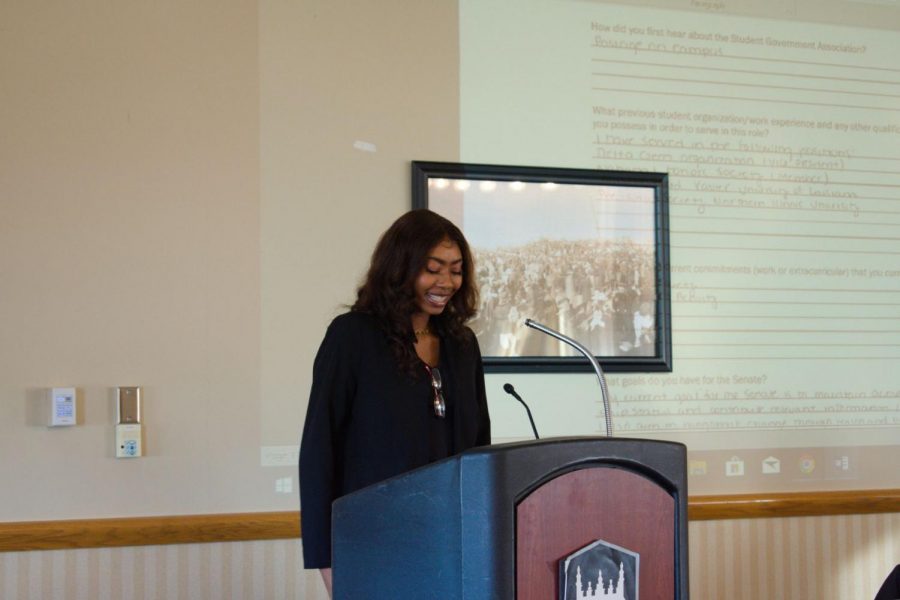SGA Senate appoints members, approves DREAM Action NIU funds
Janai Crumbley, sophomore philosophy and psychology double major, speaks at the SGA Senate meeting Sunday. Crumbley and Michael Verlinsky, junior finance major, were appointed to the SGA Senate’s body during the meeting.
February 4, 2020
DeKALB — The SGA Senate appointed Janai Crumbley, sophomore philosophy and psychology double major, and Michael Verlinsky, junior finance major to its body during Sunday’s meeting, each with unanimous approval.
“After a year, I came back home to Illinois, and I started to attend Northern,” Crumbley said. “In my first semester [at NIU], my primary focus was to mainly work on my grades and maintain a good GPA. Although this may have hindered my ability to get involved on campus, I’m very excited to do that now.”
Crumbley talked about her history of community and student organization involvement, both at NIU and her alma mater, Xavier University of Louisiana. During her time in Louisiana, she taught philosophy and debate to inner-city children, recruited volunteers for American Red Cross New Orleans and was a member of XULA’s philosophy club, she said.
Crumbley is now involved with DeKalb County Community Gardens, a nonprofit organization that aims to end hunger and food insecurity in DeKalb County, and is a member of the NIU Pre-Law Honors Society, she said.
One of Crumbley’s goals, she said, is to increase student involvement in SGA decisions by making online survey tools available for students to submit their suggestions.
“The reason people aren’t able to get their voices heard [by the SGA] is because they don’t have the time to come to meetings, or the access to resources that can help them get involved,” she said. “I think a really good strategy to combat that is [using] SurveyMonkey or LimeSurvey.”
Crumbley’s second goal is to address the divisions between demographics of people on campus by holding a social event where all students can come together and interact.
“I would … like to work with someone on a mixer or an event that can hopefully get everyone on campus together,” she said.
In addition, Verlinsky said improving campus infrastructure conditions as a means of attracting prospective students is one of his priorities.
“As we all know, the admission rates are down right now,” he said. “So I’m hoping that doing some physical and infrastructural changes to the school will improve our appearance and get us back on the radar.”
Verlinsky advocated an infrastructural project that involves expanding the parking lot outside Barsema Hall, saying the lack of available parking spaces is causing students problems.
“That’s one of the things that my friends keep complaining about all the time,” he said. “Some of them have to park in the DuSable lot and walk all the way over to Barsema just to get to class some days. [It’s] a 20 minute walk and it’s only causing more congestion.”
In his Senate application, Verlinsky expressed interest in serving on the Campus Life and Greek Affairs committees, with the hopes of improving the quality of life for students and raising the student retention rate.
Other Business
The Senate approved $1,800 in supplemental funds for DREAM Action NIU, a student organization serving the needs of undocumented students on campus, as 10 members will be attending a national conference in Chicago hosted by the United States Hispanic Leadership Institute from Feb. 20 – 23.
The funds will be used to cover registration, hotel, transportation and parking costs, according to the request document.
“We believe that attending this conference will be a benefit to our members because they will be learning more about leadership, advocacy and networking,” Ainsley Galvez, co-president of DREAM Action NIU, said, “Which we believe … are skills that are essential to people going through with their higher education.”
In addition, three pieces of legislation changing the language of the SGA Constitution, Bylaws and Senate Operating Manual were tabled for a vote next week.
These changes would reduce the number of seats in the SGA Senate from 40 to 30, reduce the number of seats per district from eight to six and reduce the maximum number of seats that may be filled in the spring elections from 35 to 25, according to the agenda.
“The rationale for this change is that our Senate number has remained stagnant for the last 10 years despite enrollment falling year to year,” Speaker of the Senate Ian Pearson said. “In order to take a little bit of a burden off recruiting on our backs, I wanted to reduce the number in a way [where] we could be a little more nimble and a little more effective.”














